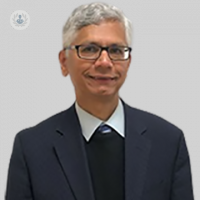Depression: Expert insight on diagnosis, treatment and recurrence
Escrito por:In this detailed article, we hear from highly respected consultant psychiatrist Dr Gopalkrishna Hegde on the most common signs of depression and discusses how the condition is diagnosed. The revered specialist also shares his expert insight on the available treatment options, including medication and other forms of therapy, and the key factors involved in preventing recurrence of depression.

What are the main signs of depression?
Depression presents in different ways. A typical depressive presentation will have what we call the core features, which include:
- a depressed mood on a sustained basis
- a loss of interest in things people used to enjoy, what we call anhedonia
- reduced energy and feeling tired or fatigued often or all the time, known as anergia
These are the core features of depression but the sad depressed mood can also sometimes present with irritability or anxiety on a sustained basis. Additionally, these core features can be associated with several other presentations, for example, feeling very low in self-esteem, feeling hopeless or worthless and thoughts of harming yourself or ending your life.
Some people also experience weight loss, reduced appetite, sleep problems or a declining interest in sexual activities. These symptoms, amongst others, can join with the core features to present as depression.
How is depression diagnosed?
The diagnosis of depression is like that of any other condition. Most of the time, we have a referral note from the patient or from their GP with some details.
We get a history and also perform a mental status examination to find out what the person is thinking and feeling and any risk issues. We may also perform or request a physical examination or some other investigations if we consider that there is an associated problem. In some cases, we may also corroborate things by talking to the person’s family (with their consent).
We then put all of this information together to make a formulation. In straightforward cases, this may be done in one meeting or sometimes we may require more meetings to pull things together.
With all of this information at hand, we can assess whether a person’s condition is mild, moderate or severe depending upon number of symptoms. We also have to then consider whether the person has any associated features, like psychotic features. Depression in its most severe form is quite often accompanied with psychotic thinking.
Factoring in all of this information, the treatment plan will change accordingly. This is the most typical format for diagnosis of depression in the clinical setting although in some cases, rating scales and other resources may be used to measure the severity of a person’s condition. Overall, however, depression is diagnosed by clinical assessment.
What is happening in the brain of someone experiencing depression?
The brain is the central place where a lot of things happen, or don't happen, when it comes to mental health. In depression in particular, genetic and environmental factors play a key role and may be long-standing. However, there are a number of additional ways in which depression can be induced through the brain.
The neuroendocrine system - neurochemicals and endocrine (hormones) in the brain, or in other parts of the body can be affected by some factors. Where the available level of a hormone or chemical is not sufficient, this can cause depression. This relates to different chemicals, such as serotonin, which are used in targeted medications, such as antidepressants like SSRI (selective serotonin re-uptake inhibitors), to enhance and regulate low levels of the relevant chemical.
In addition, hormones related to the thyroid or other parts of the body’s hormone system (which is influenced by the brain) can become affected and cause depression.
There are also organic conditions, such as multiple sclerosis, in which people experience depression. This relates to structural changes which happen in the brain. There are a lot of advanced studies indicating changes in the structure of the brain that are visible through MRI and PET scans. These changes occur in the temporal lobe or lower part of the frontal lobe. As a result, the ventricle (where the cerebrospinal fluid is held in the brain) becomes enlarged, meaning that a part of the brain has shrunk.
Drugs can also affect the brain and lead to mental health problems, particularly depression. In addition, infections, including viral infections, can also work through the brain and cause depression.
What treatments are available for depression?
Treatment for depression is available in different forms. As I mentioned earlier, there are biological, psychological and social causes of depression and in similar way, there are a range of treatment approaches.
In terms of biological treatment, drugs - most commonly antidepressants – are available. There are different types of antidepressants available, including SSRI (serotonin-reactive inhibitors). Formerly, tricyclic antidepressants were very commonly used but nowadays we don’t tend to use them mostly because of the side effect profile.
Other drugs may also be used in addition to antidepressants, including antipsychotics, for example, if there is a psychotic feature associated or anti-anxiety medication where appropriate. Drugs like mood stabilisers, such as Lithium, can also be used.
There are other groups of medications including SNRIs (serotonin and norepinephrine reuptake inhibitors) like Venlafaxine, which is a combination of serotonin and norepinephrine mechanisms. Additionally, there is another group called MAO inhibitors (monoamine oxidase inhibitors).
In addition to drug treatments, there are other options. These include cognitive behavioural therapy (CBT), especially in mild to moderate depression, as well as group therapies, art therapies, and psychosocial interventions, which can all be helpful. Our colleagues in the occupational therapy department, as well as social workers, can also do a lot of work with the patient alongside these therapies to deal with some of the psychosocial issues at play.
Another form of treatment is electroconvulsive therapy (ECT) which is used only rarely, in severe depression. Although it is not commonly needed (because other forms of treatment are effective), ECT is beneficial in some cases.
Treatment resistant depression
When it comes to treatment resistant depression, managing compliance is key. Patients should take their medication or follow treatment as long as it is advised and be well supported to do so, so that they don't stop prematurely.
Lifestyle changes are also important including keeping healthy, exercising well, eating good food and sleeping in good time. In addition, to help patients adapt to their work environment, employers can provide support by making appropriate modifications as necessary.
Sometimes we have to simply treat the cause, such as a thyroid problem, and understanding what the root cause is and treating it can then allow the depression to be solved. Often, if this is ignored and things continue, the depression can become chronic.
The need for engaging in the treatment plan (for as long as it takes) is really the key aspect to find an effective solution, stop the recurrence and resolve the chronic issues.
Is it possible to prevent recurrence of depression?
Preventing the recurrence of depression is very important and it is possible. Compliance with the treatment plan, whether it is medication or non-medication based, is important and should be maintained as long as is advised by the practitioner.
Additionally, positive lifestyle changes and maintaining a healthy work-life balance is key. It’s also essential to identify and address the causes of depression in order to prevent recurrence. This also relates to being aware of what causes the relapse or recurrence of depression. As such, educating the patient and their family on this can help to nip problems in the bud so that the relapse can be stopped before it becomes a full-blown problem.
If you are seeking treatment for depression and wish to schedule a consultation with Dr Hegde, you can do so by visiting his Top Doctors profile.



